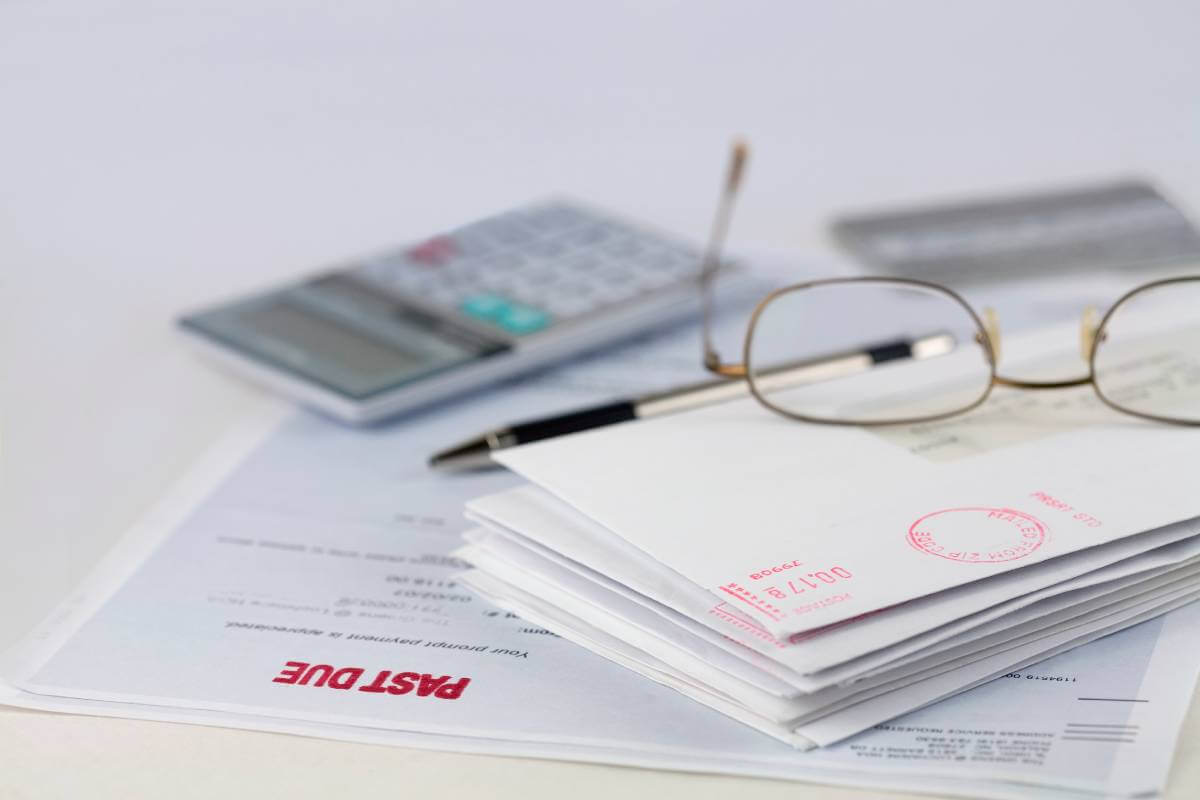A Small Business Owner's Guide to Debt Collection

Editor's note: This post was originally published Sept. 4, 2017, and has been updated for accuracy, comprehensiveness and freshness on July 16, 2025.
Running a small business is challenging enough without having to chase down unpaid invoices. Unfortunately, many small business owners struggle with delinquent accounts and money owed by a business that seems impossible to collect. Whether you're dealing with late payments, ignored invoices, or clients who've gone completely silent, you're not alone.
We don’t want you to take on this challenging aspect of business ownership on your own. To give you some guidance, this article covers everything you need to know about small business debt collection — from professional self-collection tactics to knowing when it's time to involve legal help. You'll learn how to collect debt effectively while maintaining important client relationships and protecting your business's reputation.
Successful debt recovery for business requires a strategic approach that balances persistence with professionalism. The key is understanding your options, knowing your rights, and having a clear plan for escalating collection efforts when necessary.

What is small business debt collection?
Small business debt collection refers to the process of recovering unpaid debts owed to your business by customers, clients, or other businesses. This specialized form of debt recovery involves unique legal considerations and strategies that depend entirely on whether you're collecting from businesses or individual consumers.
Commercial debt collection
Commercial debt collection focuses specifically on business-to-business (B2B) transactions. When you're dealing with money owed by a business, you're operating in the commercial debt collection space, which involves collecting debts between businesses, corporations, partnerships, and other commercial entities.
Commercial debt collection operates under significantly fewer legal restrictions than consumer debt collection. The Fair Debt Collection Practices Act (FDCPA) and many state debt collection laws primarily protect individual consumers, not businesses. This means commercial debt collectors have more flexibility in their communication methods, frequency of contact, and collection strategies.
Key characteristics of commercial debt collection:
- Fewer communication restrictions - Collectors can contact businesses more frequently and at various times.
- Direct approach permitted - More aggressive collection tactics are generally allowed.
- Business-focused remedies - Options like mechanic's liens, Uniform Commercial Code (UCC) filings, and business asset seizure.
- Professional relationship considerations - Collections often involve ongoing business relationships.

Consumer debt collection
Consumer debt collection is the collection of debts from individual consumers for issues that range from personal to family to household. This type of collection is heavily regulated by federal and state laws designed to protect consumers from harassment and abuse.
The FDCPA governs consumer debt collection, imposing specific rules to protect consumers. These rules include how collectors can pursue collection, such as regulations about when they can contact consumers and what they can say. State laws often provide additional consumer protections that make this type of collection more restrictive. To understand the rules in your specific state, you’ll want to speak with someone experienced, like a LegalShield provider lawyer.
Key characteristics of consumer debt collection:
- Strict communication rules - limited calling hours, frequency restrictions, and required disclosures
- Harassment prohibitions - explicit bans on threatening or abusive language
- Verification requirements - consumers can request debt validation and dispute procedures
- Individual protections - exemptions for certain income types and asset protections
Why the distinction matters for small business debt recovery
Understanding whether you're dealing with commercial or consumer debt is crucial for small business debt recovery because it determines your legal rights, available collection methods, and potential consequences for violations. When you're collecting money owed by a business, you have more collection options and fewer legal restrictions than when collecting from individual consumers.
This distinction affects your approach, communication strategies, and available legal remedies. Misunderstanding these differences can lead to legal complications, ineffective collection efforts, or missed opportunities to recover what you're owed.
Common reasons small businesses face debt collection challenges
Small business debt collection challenges stem from various factors that can make recovering owed money particularly difficult. Understanding these common issues helps you prepare better collection strategies and prevent future problems.
1. Late payments and cash flow problems
- Late payments: A significant hurdle for small businesses is when customers pay late or not at all, leading to cash flow shortages.
- Cash flow disruptions: This can hinder the business's ability to cover expenses like payroll, rent, and inventory, creating a domino effect.
2. Difficulty in locating debtors
- Moving or changing contact information: Customers may move, change phone numbers, or close bank accounts, making it difficult for businesses to track them down.
3. Ineffective communication and dispute resolution
- Communication breakdowns: Debtors may ignore or avoid communication from the business, making it challenging to negotiate payment plans.
- Disputes over invoices: Debtors may dispute the amount owed, the accuracy of the invoice, or even the legitimacy of the debt, requiring additional time and resources to resolve.
4. Economic and market conditions
- Economic downturns: Recessions or economic downturns can impact debtors' ability to pay, even if they want to.
- Fluctuating markets: Changes in the market can affect customer spending and their ability to meet financial obligations.
5. Internal factors
- Insufficient capital: Many small businesses struggle with inadequate funding, which can be further strained by unpaid invoices.
- Poor documentation: Inaccurate or incomplete records of invoices, payment agreements, and communication can complicate debt recovery.
- Lack of experience in debt collection: Small businesses may lack the knowledge and resources to effectively pursue debt collection, especially when dealing with difficult or unresponsive debtors.

How to collect a business debt professionally
Collecting overdue payments doesn’t have to ruin relationships—or your reputation. Here’s a simple, professional process to help you recover business debts while staying compliant and respectful.
Step 1: Start with a courteous reminder
As soon as a payment becomes overdue, reach out with a friendly reminder.
- Send a brief, polite email or make a quick phone call.
- Acknowledge that the invoice may have been overlooked.
- Attach a copy of the original invoice and restate the payment terms and total due.
This small gesture often prompts payment without the need for escalation.
Step 2: Follow up with formal communication
If the initial reminder goes unanswered, it’s time to escalate with a more direct message.
- Send a professional but firm email or letter referencing the overdue status.
- Clearly state the total amount owed and how long it’s been past due.
- Outline any next steps or potential consequences (such as late fees, account holds, or further collection efforts).
Make sure the tone remains professional—not emotional or aggressive.
Step 3: Offer flexible payment options
When appropriate, give the debtor an opportunity to resolve the debt cooperatively.
- Offer a payment plan or partial payment agreement if cash flow issues are cited.
- Ask the client to propose a realistic timeline, then confirm it in writing.
- Keep your terms clear to avoid future confusion.
Many professional debt collectors for small businesses use this approach to preserve the relationship and recover at least partial funds quickly.
Step 4: Document everything
Throughout the entire process, maintain thorough documentation of your collection efforts.
- Save all emails, letters, texts, and call notes.
- Track payment promises, dates, and any arrangements made.
- Note if the client acknowledged the debt in writing or by phone.
This paper trail is crucial if you need to involve legal counsel or escalate to formal business debt recovery later.
Step 5: Maintain professionalism at all times
No matter how long the debt has been owed, stay calm, polite, and factual.
- Avoid using emotional language, accusations, or threats.
- Don’t promise legal action or penalties unless you truly intend to follow through.
- A professional tone protects your business reputation and keeps you in compliance with debt collection laws.
Staying professional gives you the upper hand—legally and relationally.

Common mistakes to avoid in small business debt collection
When trying to recover unpaid invoices, it’s just as important to know what not to do. Making the wrong move can hurt your reputation, weaken your case, or even land you in legal trouble. Here are key mistakes to avoid during small business debt collection efforts.
1. Don’t make legal threats that you won’t follow through on
Threatening legal action might seem like a way to pressure a debtor—but unless you're actually prepared to sue, it can backfire.
- Empty threats damage your credibility and make you appear unserious.
- In some cases, threatening legal action without intent to act can violate debt collection laws.
- If legal escalation is an option, be sure your communication is professional, documented, and grounded in fact.
Stick to actions you’re actually willing to take. Your follow-through matters more than tough talk.
2. Don’t harass or overwhelm the debtor
Persistent follow-up is part of the process—but overdoing it crosses a line. Excessive calls, emails, or messages can be seen as harassment and may violate commercial debt collection standards.
- Avoid contacting the debtor multiple times a day.
- Use respectful language and avoid aggressive or intimidating tones.
- Document your outreach schedule to stay consistent and within reasonable limits.
Even in business-to-business collections, your communication should stay calm, limited, and professional.
3. Don’t publicly shame or disclose the debt
Never discuss a debtor’s situation publicly or with third parties. Trying to embarrass someone into paying can result in legal action against you.
- Public shaming can lead to defamation claims or privacy law violations.
- Sharing debtor information with competitors, employees, or on social media can create significant legal and reputational risks.
- Keep all communication private and between the parties directly involved.
Your collection efforts should always respect confidentiality and business decorum.
4. Don’t ignore commercial debt collection laws
Even though commercial debt recovery is less regulated than consumer debt, you’re still expected to follow basic legal standards.
- Laws vary by state, especially when it comes to communication limits and legal threats.
- Some states have laws around business-to-business communications or deceptive practices, even if federal laws don’t have the same requirements.
- Violating collection laws could not only cost you the debt—it could expose your business to liability.
Stay informed about applicable laws in your state before escalating any collection activity.

When to hire a debt collection agency or attorney
Knowing when to escalate small business debt recovery efforts is crucial for maximizing your chances of collection while minimizing costs. Several key indicators suggest it's time to bring in professional help:
- Payment is 90+ days past due despite consistent follow-up efforts. At this point, self-collection efforts have likely reached their effectiveness limit, and professional intervention becomes necessary.
- The debt amount is significant and you have written contracts or clear documentation. Larger debts justify the cost of professional collection services, especially when you have strong legal grounds for collection.
- The debtor is completely unresponsive to all communication attempts. When businesses ignore your calls, emails, and letters, professional debt collectors for small businesses or attorneys can often get their attention through formal legal channels.
- You're unsure about your legal rights or next steps. If you're dealing with complex contractual issues or potential legal disputes, consulting with an attorney ensures you don't accidentally harm your case or violate any laws.
- The debtor disputes the debt or claims breach of contract. Legal disputes require professional knowledge to navigate properly and protect your interests.
6 legal options for small business debt recovery
If your business is owed money, understanding your legal options for debt recovery is essential. From low-cost strategies to full-scale lawsuits, here are the key ways to pursue small business debt collection effectively.
1. File a claim in small claims court
Small claims court is often the fastest and most affordable route for collecting smaller debts. Most states allow you to sue for amounts ranging from $5,000 to $10,000 without needing an attorney.
- This option is best for unpaid invoices, simple loan defaults, or service fees.
- The process is streamlined and usually resolved in a single hearing.
- Filing fees are low, and you typically don't need legal representation.
It’s a practical option for small business debt recovery when the debt amount is modest and the facts are straightforward.
2. Send a formal demand letter
A demand letter from an attorney adds legal weight to your collection efforts. These letters clearly state the amount owed, reference any contractual agreements, and outline the legal consequences of non-payment.
- Debtors often respond quickly when they realize legal action is imminent.
- Many attorneys charge flat fees for drafting demand letters.
- This is a strong pre-litigation strategy that shows you're serious.
It’s a professional way to encourage payment without jumping straight to a lawsuit.
3. Pursue a civil lawsuit in regular court
For larger debts or more complex disputes, filing a civil lawsuit in a state or county court may be necessary.
- Lawsuits allow you to seek a judgment, which can then be enforced.
- Collection tools like wage garnishment, bank levies, or asset seizure become available once a judgment is entered.
- This route involves legal fees and takes more time but offers stronger enforcement options.
If the debt is significant or the debtor refuses to cooperate, this step may be unavoidable for commercial debt recovery.
4. File a lien or seek asset seizure
In some cases, you can file a lien against the debtor’s business property or other assets.
- Mechanic’s liens, UCC filings, or judgment liens may apply depending on the type of debt and your state's laws.
- A lien can impact the debtor’s ability to sell property or borrow money.
- If you have a judgment, you may also be able to seize business assets or place levies on accounts.
These remedies are powerful but often require legal support to execute properly.
5. Check the statute of limitations
Before pursuing legal action, be aware of your state’s statute of limitations for collecting commercial debts.
- Most states set a deadline between 3 to 6 years, starting from the last payment or breach of contract.
- If you wait too long, you may lose your right to sue entirely—even if the debt is valid.
- Some states have separate deadlines for written contracts, verbal agreements, or promissory notes.
Act promptly to preserve your legal rights and strengthen your collection position.
6. Consider hiring an attorney
If informal efforts have failed, consult an attorney to explore your legal options.
- Attorneys can assess the strength of your case and recommend the best path forward.
- They may work on contingency or offer fixed fees for specific actions.
- Legal representation is especially important when navigating complex state laws or recovering large sums.
Getting legal help can improve your chances of success and protect your business interests.
Can a small business use a debt collector?
Yes, small businesses can absolutely hire commercial debt collectors, and this is often an effective solution for small business debt collection. However, the process works differently than consumer debt collection.
- Commercial debt collectors specialize in business-to-business collections. They understand the unique challenges of collecting money owed by a business and have established processes for dealing with commercial debtors.
- The Federal Debt Collection Practices Act (FDCPA) primarily applies to consumer debt collection, not business-to-business collections. This means debt collectors for small businesses have more flexibility in their collection tactics when dealing with commercial debtors.
- Contingency fee arrangements are common in commercial debt collection. Most agencies work on a percentage basis, typically charging 25-50% of collected amounts. This means you only pay if they're successful in collecting the debt.
- Choose reputable collectors by researching their track record, checking references, and verifying they're licensed in your state. Look for collectors who specialize in your industry or debt type for better results.
- Maintain some control over the collection process by choosing agencies that keep you informed about their progress and strategies. You should always know what actions are being taken on your behalf.

How to prevent unpaid business debts going forward
Prevention is always better than collection when it comes to small business debt recovery. Implementing strong credit and payment policies can significantly reduce your future collection challenges:
- Use written contracts for all business transactions. Clear, written agreements with specific payment terms, deadlines, and consequences for late payment provide the legal foundation for effective collection efforts.
- Establish credit policies that include credit checks for new clients, especially for large transactions. Understanding your customers' payment history helps you make informed decisions about extending credit.
- Send invoices promptly and follow up within 7-10 days of missed payments. Quick action on overdue accounts significantly improves collection rates and prevents small problems from becoming major ones.
- Implement automated systems for invoicing and payment reminders. Technology can help you maintain consistent follow-up without requiring manual effort, improving both efficiency and collection rates.
- Require deposits or partial payments for large projects or new clients. This reduces your exposure to bad debt and demonstrates the client's commitment to payment.
- Offer multiple payment options to make it easy for clients to pay. Credit cards, electronic transfers, and online payment systems can reduce friction and improve payment timing.
Take control of debt collection with confidence
Unpaid invoices are an unfortunate reality of business ownership, but they don't have to threaten your company's survival. With the right approach to small business debt collection, you can recover most of what you're owed while maintaining professional relationships.
Start with professional self-collection efforts using the strategies outlined in this guide. Most debts can be resolved through persistent, professional communication and flexible payment arrangements. However, don't hesitate to escalate to professional help when self-collection efforts aren't working.
Remember that debt recovery for business is a skill that improves with experience. The more you understand about what to do if a business owes you money, the more confident and effective you'll become at collection efforts.
How LegalShield can help with your debt collection needs
LegalShield offers small business owners access to legal support for small business debt collection for an affordable monthly fee. LegalShield members gain access to provider law firms that can help with commercial debt recovery and understand the unique challenges small businesses face.
- Legal consultation for an unlimited number of legal matters are available to help you understand your rights and options when dealing with money owed by a business. Whether you're unsure about your legal standing or need advice on collection strategies, LegalShield provider attorneys can guide you through the process.
- Document review services ensure your contracts and collection letters are legally sound. LegalShield members can submit documents for attorney review, helping you create stronger agreements and more effective collection communications.
- Attorney-drafted collection letters are sent on law firm letterhead directly to debtors on your behalf. This professional approach often gets results that self-collection efforts can't achieve, and you keep 100% of any funds collected.
- Legal representation is available at a discounted rate when collection efforts escalate to formal legal action. LegalShield provider attorneys can represent you in small claims court, draft formal demand letters, and pursue other legal remedies for debt recovery.
With LegalShield's small business plans starting at just $49 per month, you get access to professional legal support that could otherwise cost hundreds of dollars per hour. This makes effective debt collectors for small business services accessible to companies of all sizes, helping you recover what you're owed while protecting your business interests.
_____________________________________________________________
Written by Elyse Dillard, Content Specialist at LegalShield. Elyse creates educational resources about legal and identity theft protection services. She works to make complex legal concepts more accessible to readers and has contributed to numerous articles on the LegalShield blog.
Paid Legal Services, Inc. ("PPLSI") provides this blog as a public service and for general information only. The information made available in this blog is meant to provide general information and is not intended to provide legal advice, render an opinion, or provide a recommendation as to a specific matter. The blog post is not a substitute for competent legal counsel from a licensed professional lawyer in the state or province where your legal issues exist, and you should seek legal counsel for your specific legal matter. All information by authors is accepted in good faith. However, PPLSI makes no representation or warranty of any kind, express or implied, regarding the accuracy, adequacy, validity, reliability, availability, or completeness of such information. The materials contained herein are not regularly updated and may not reflect the most current legal information. No person should either act or refrain from acting on the basis of anything contained on this website. Nothing on this blog is meant to, or does, create an attorney-client relationship with any reader or user. An attorney-client relationship may be formed only after the execution of an engagement letter with an attorney and after that attorney has confirmed that no conflicts of interest exist. Nothing on this website, or information contained or transmitted by this website, is intended to be an advertisement or solicitation. Information contained in the blog may be provided by authors who could be a third-party paid contributor.
PPLSI provides access to legal services offered by a network of provider law firms to PPLSI members through membership-based participation. Neither PPLSI is not a law firm, and its officers, employees or sales associates do not directly or indirectly provide legal services, representation, or advice.


